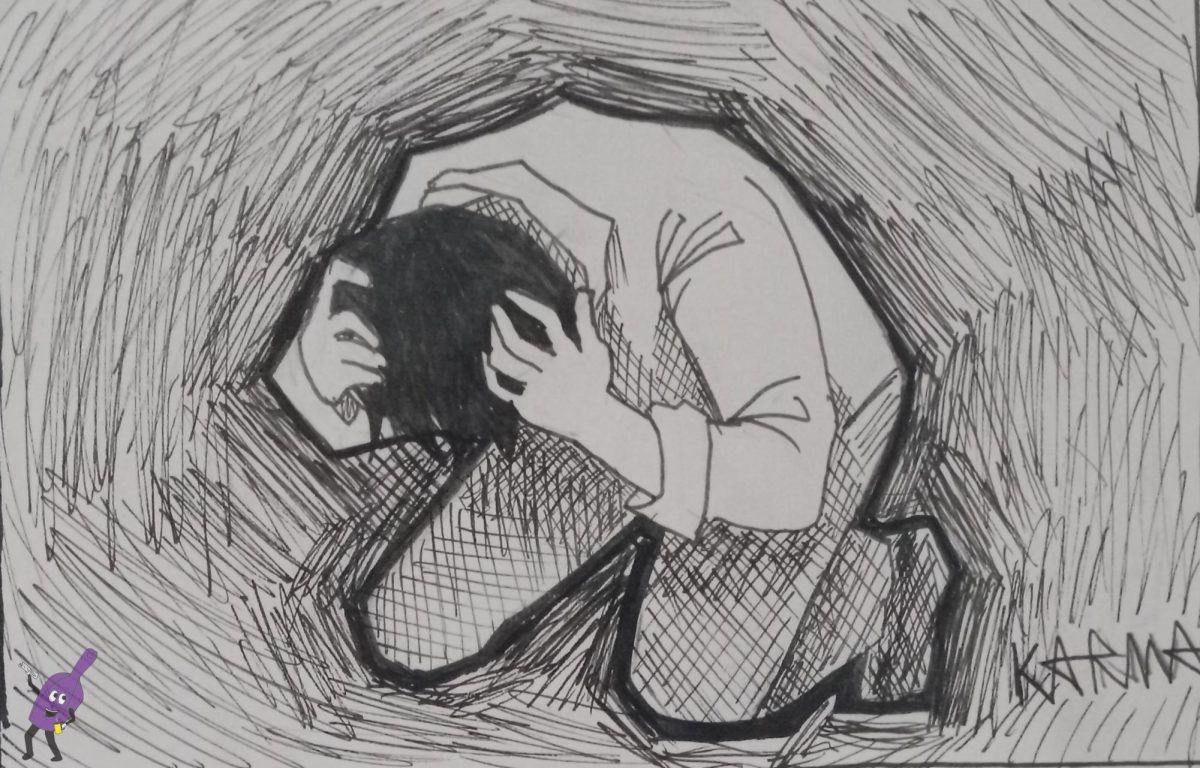The penultimate piece of a deep dive into how teens handle their anxiety.
The lights are dim and Final Sentinel Student* (F.S.S.) is planted on a black wooden block, swaying side to side like the pendulum of a grandfather clock; their face is decorated in fun colored make-up and their clothes in white cat hair. It’s easy to tell that they are mildly confused as to why they are here but smiling nonetheless.
“Pretty [much a] love hate relationship” is how F.S.S. defined their feelings toward their anxieties when asked to do so in a sentence or less. To explain, they said that they simply don’t pay much attention to it unless they feel the need to. If Final Sentinel Student is preparing for a test or trying to quickly finish homework they might let their anxiety sway them into taking care of business. However, they don’t let it bother them when they don’t see a use.
When asked how long they have struggled with anxiety F.S.S. noted “specifically since fifth grade, but I have genetic anxiety so probably my whole life.” Final Sentinel Student experienced trauma in those younger years that led to what they deemed as unhealthy behaviors. The isolation they experienced in seventh grade due to the pandemic also added to this.
As F.S.S. sat alone with themselves at that time they noticed that many of their habits aligned with the same lack of self care their abuser had shown when Final Sentinel Student was growing up. “And in eighth grade I realized how [harshly] I was talking to myself…and I decided to turn that around and try something else.” They feel that if they hadn’t changed their mind set they would have fallen apart from their internal struggles.
F.S.S. says that at first their version of coping looked like just not dealing with their anxiety, and letting it take control. For a while that did work, because Final Sentinel Student was just getting used to the feeling of being anxious, but it didn’t end up being very healthy. So after even more inward reflection they have found a few specific things to do that work for them.
“If I notice that I am really anxious I…just talk to myself [mentally] about it.” Walking themselves through the motions and recognizing that F.S.S. is anxious, but they don’t necessarily need to be, helps them to rationalize the situation. The usual breathing exercises and cold water to the face don’t seem to help Final Sentinel Student as much as the big existential thoughts.
They did note that the existence of specific friends and family members can comfort them sometimes. The people in mind don’t even have to do anything to calm F.S.S. It’s just nice to know they have someone out there to support them.
Final Sentinel Student believes that their version of coping has a unique spin on it compared to the mechanisms of others. While they sit with their anxiety and process it on their own like many people do, the end result seems to be different. For most letting your emotions build up and locking them away deep inside can be extremely draining, and can lead to what feels like a self implosion of anxiety arising later on. For F.S.S. this way of managing their anxiety has worked in their favor. “Sitting with it…has [let] me know myself [better] and that has made me happier and a lot more comfortable in the world than I think [so many] people are.”
It’s not that Final Sentinel Student ignores their anxiety all together, it’s that they don’t try to hold it back, which makes things much more comfortable to deal with. “It’s like having a little jar in my brain that I put things in.”
They assume that they probably have secret ways of coping that they don’t even realize they do, like swaying side to side as they have done for the last several minutes, F.S.S. points out. It’s also more than likely they have picked up things from different therapists and those around them as well.
When Final Sentinel Student reflects on whether or not the world helps them to cope they think of how often they might spiral worrying about the chaos and hate all over the globe. Like many teens, they sit there and wonder what they can do to fix all of it’s issues, but then they remember they are only one person, and that there are billions of others out there working hard to make change. So even though the world isn’t doing the best it could be, F.S.S. pushes themselves not to overthink the state of things, despite constant pressure to do so.
Seeing that the world doesn’t seem to help Final Sentinel Student too much they were asked if their anxiety in general was ever helpful. They explained that it has had its benefits, usually it’s handy for things like getting good grades where their anxiety is the motivator. Adding on to that, there have been times where anxiety has been crucial to F.S.S. ‘s and others safety.
When they experienced trauma at the hands of others, Final Sentinel Student learned quickly that the behaviors of those around them were not typical nor ok. Their anxiety about such things has helped them to recognize the patterns of dangerous actions and assisted them and friends of theirs to steer clear of it.
As they grow, F.S.S. is hopeful that they can reach an even better relationship with their anxiety, and that when needed for situations like the aforementioned they can turn it on like a light switch. They would like to have more of a symbiotic relationship than a parasitic one, or “an ability to see that you have it and use it if it’s necessary.”
Final Sentinel Student parts with a bit of advice for those struggling out there, “We have time to figure our lives out, and you don’t have to do it as fast as I did. Even if it makes high school easier.”
*For the comfort and safety of those interviewed all subjects of this series will remain anonymous.





